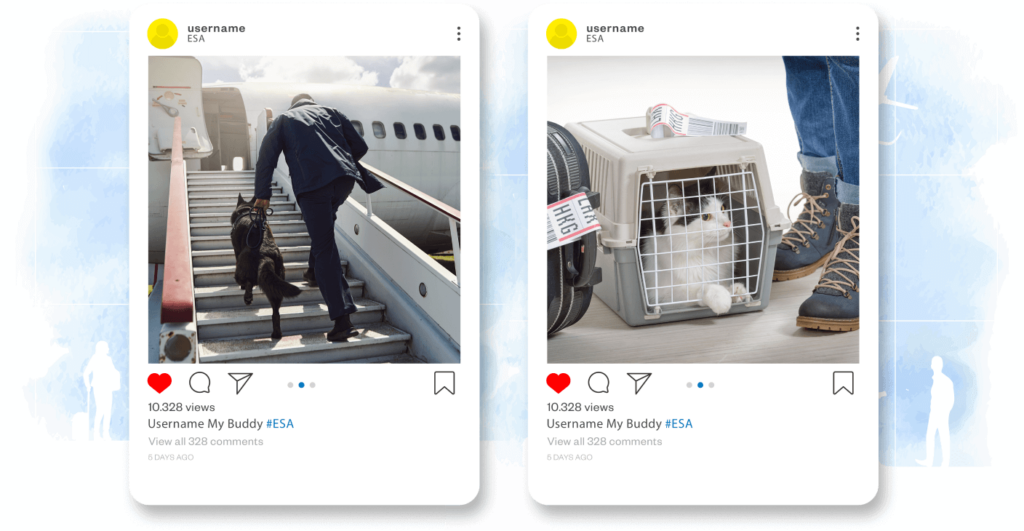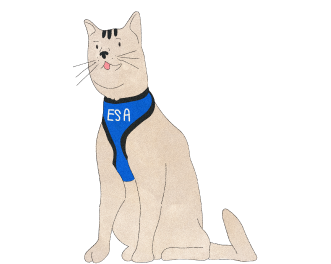What is the Air Carrier Access Act?
The Air Carrier Access Act went into effect in 1986 and prohibits discrimination in air travel on the basis of a person’s disability. This law requires air carriers to accommodate the needs of passengers with disabilities, including the accommodation of service animals. Because of the Air Carrier Access Act (ACAA), service animals are permitted to ride in the airline cabin with their handler (provided the animal is not too large or too heavy) and a person with disabilities cannot be charged a pet fee when traveling with their service animal.
This law applies to all flights of U.S. airlines as well as flights to or from the United States by foreign airlines.Airlines may, however, request specific documentation and/or 48-hour advanced notice if a service dog is boarding a flight, such as an official document from a licensed mental health professional confirming an individual’s mental or emotional disability and their need for their assistance animal.For a psychiatric service dog, this document will take the form of a Psychiatric Service Dog Letter, also called a Psychiatric Service Dog Travel Letter.

For emotional support animals, this document is commonly referred to as an ESA Letter, or more specifically, an ESA Travel Letter. The allowance of emotional support animals onboard flights varies from airline to airline, however, so travelers should always contact an airline in advance to confirm any policies or restrictions when it comes to emotional support dogs and other types of assistance animals.
Travelers may also opt to book their flight with an ESA-friendly airline to better suit their travel needs.If at any time, an airline staff member is violating a disabled person’s rights under the ACAA, that individual has the right to speak with a Complaints Resolution Official (CRO). The U.S. Department of Transportation advises that “A CRO is the airline’s expert on disability accommodation issues. Airlines are required to make one available…at no cost, in person at the airport or by telephone during the times they are operating.”

Are Emotional Support Animals Allowed on Flights?

As of January 11, 2021, the U.S. Department of Transportation allows each individual airline to determine its own policies and regulations when it comes to emotional support animals.
While airlines such as Delta, United, and Air Canada no longer recognize emotional support animals as a type of assistance animal, these air carriers may still permit individuals to travel with their comfort animal as long as the individual pays a pet fee, the way pet owners typically do when traveling with a companion animal.There may, however, be restrictions in place in terms of an animal’s weight, size, or breed, so ESA owners should always contact their airline of choice ahead of time for more information about the air carrier’s policies.
Those with concerns can also opt to travel with one of several ESA-friendly airlines that still permit emotional support animals onboard flights. These airlines will require proper documentation (in the form of an ESA letter) in order to confirm that the animal’s presence is required to help with emotional conditions or a mental disability.
How to Qualify for an ESA Letter / Emotional Support Animal?
As previously mentioned, comfort animals like emotional support dogs are commonly prescribed to those living with mental disabilities or emotional conditions such as anxiety, depression, PTSD (post traumatic stress disorder), and other types of mental disorders. A person’s disability must be one that’s found in the Diagnostic and Statistical Manual, also known as the DSM. Mental health professionals all over the world commonly refer to this handbook to establish reliable diagnoses.
To qualify for a comfort animal, therefore, a licensed mental health professional must first determine that an individual has a mental disability or mental illness as classified by the DSM. Apart from mental health professionals such as psychologists and licensed counselors, this determination can also be made by an individual’s general practitioner.For those who may not already have access to a mental health professional or physician, telehealth can help make the process of getting an emotional support dog easy. Telehealth platforms such as CertaPet improve access to mental health care, with a focus on providing services to individuals who are seeking animal assisted interventions as part of their treatment plan.

Typically, the process of getting an emotional support animal letter from one of these telehealth platforms will begin with an online questionnaire. The online questionnaire serves as a pre-screening to determine if an individual qualifies for an emotional support dog or cat (although other domestic animals like rabbits are also a common option).
The online questionnaire takes only minutes to complete, and if the pre-screening determines an individual qualifies for an ESA, they are then connected to a licensed mental health professional for a consultation. The mental health professional will speak with the individual about their needs, and if the professional believes an ESA will be a beneficial part of the patient’s treatment plan, they will issue an emotional support animal ESA letter. An individual will typically receive immediate access to a PDF version of their emotional support animal letter, which they can print from a home computer. Most telehealth platforms also offer the option of mailing an ESA letter.
A legitimate ESA letter will always be printed on the licensed professional’s letterhead and include their licensing information in addition to being signed and dated by the prescribing professional. The ESA letter will clearly establish that the patient in question has a confirmed disability and that an emotional support animal provides them with needed support.
The ESA letter entitles its holder to reasonable accommodation when it comes to housing (meaning an individual cannot be charged a pet fee or pet deposit for having an ESA, nor can they be denied housing in a no-pets property). This reasonable accommodation is made possible because of the Fair Housing Act. An ESA letter also provides the proper documentation required when traveling with an airline that permits emotional support dogs and other types of ESAs onboard flights.



 Facebook
Facebook LinkedIn
LinkedIn Twitter
Twitter Copy Link
Copy Link
